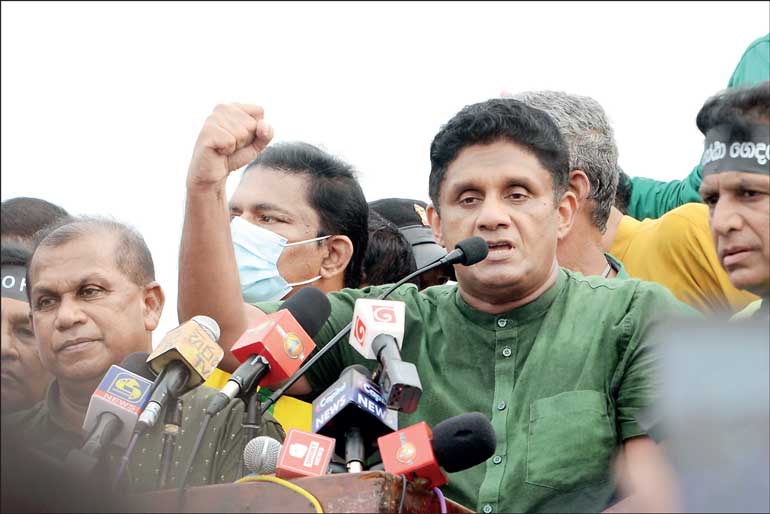Sunday Feb 15, 2026
Sunday Feb 15, 2026
Friday, 18 March 2022 00:00 - - {{hitsCtrl.values.hits}}

Should a responsible political leader mislead the average voter by making such irresponsible and unattainable demands?
At a massive public rally on Tuesday, the Leader of the Opposition is reported to have “challenged President Gotabaya Rajapaksa to call a snap presidential election”. If the SLPP was not prepared to do so, the Leader of the Opposition was reported to have demanded that “it should hand over the government to the SJB”. It is unfortunate that a politician at the helm of a major political party should have made such irresponsible and unattainable demands.
Opposition was reported to have demanded that “it should hand over the government to the SJB”. It is unfortunate that a politician at the helm of a major political party should have made such irresponsible and unattainable demands.
Replacing the President
Under our Constitution, the President has no power to call a “snap presidential election”.
Under Article 31, the President may “at any time after the expiration of four years from the commencement of his first term of office” declare his intention of appealing to the People for a mandate to hold office by election for a second term. The current President’s first term commenced in November 2019, and therefore he cannot invoke this Article until November 2023. Moreover, he may invoke it only if he himself is seeking a second term.
Under Article 38(1) of the Constitution, the President may resign his office at any time. If he does so, Parliament is required, within one month, by secret ballot and by an absolute majority, to elect one of its members to serve as President for the unexpired period of his term of office. Until Parliament does so, the Prime Minister will act in the office of President.
A third method of removing the President is set out in Article 38(2) of the Constitution. If two-thirds of all the Members of Parliament submit a resolution to the Speaker alleging that the President “is permanently incapable of discharging the functions of his office by reason of mental or physical infirmity”, or that the President has been guilty of (i) intentional violation of the Constitution; (ii) treason; (iii) bribery; (iv) misconduct or corruption involving the abuse of the powers of his office; or (v) any offence involving moral turpitude, and if that resolution is passed by two-thirds of all the members, the Speaker is required to refer it to the Supreme Court for inquiry and report.
If, after a trial at which the President is entitled to defend himself, the Supreme Court determines that the allegations have been proved, Parliament may, by a two-thirds majority, remove the President from office.
Therefore, it is a futile demand to make in the presence of thousands of unsuspecting voters, that the President should call a “snap presidential election”.
Hand over the Government
The Opposition Leader’s other demand that the SLPP should “hand over the Government” to the SJB is also unattainable. If what he is demanding is that he, as the leader of the SJB, should be appointed Prime Minister, that too is unattainable. Article 43 requires the President to appoint as Prime Minister the Member of Parliament who, in his opinion, is most likely to command the confidence of Parliament. To command the confidence of Parliament a member must be assured of the support of at least 113 of its members. Does the SJB leader satisfy that requirement? Apparently not. In any event, the Head of the Government is the President. For as long as the Constitution provides for a President with full executive powers, it is the President who forms the Government, and there is no way in which the SLPP can “hand over the Government” to anyone.
The only way in which the SJB can be in a government is by securing a majority of seats at a general election. The present Parliament was elected in 2020 for a five-year term. Therefore, a general election can be held before September 2025 only if Parliament is dissolved before that date. The President has the power to do so but, under Article 70, only after March 2023. Parliament may, of course, request a dissolution at any time, but that would require a resolution passed by a majority vote in Parliament. How, then, does the Leader of the Opposition expect the Government to be “handed over” to him now, and by whom?
Conclusion
Under the 1946 and 1972 Constitutions, the Governor-General/President was a constitutional Head of State. Under both those Constitutions, it would have been possible for strong public opinion, as demonstrated at the SJB-organised gathering this week, and manifested daily throughout the country by thousands suffering due to the lack of essential foodstuffs, fuel, gas, milk powder, etc., and further compounded by corruption of an unprecedented level, to have compelled a Prime Minister to tender the resignation of his/her government and enable another political party leader to form a government, or to advice the dissolution of Parliament to enable a general election to be held.
However, following the 20th Amendment, where all executive power is vested in a single individual (an autocratic, outdated system of government which the leader of the SJB apparently wishes to perpetuate, as evidenced by the promises he made when he sought election to that office, and as repeatedly affirmed by his international affairs adviser), it is impossible to force a “snap general election” or for one political party to “hand over the government” to another.
Should a responsible political leader mislead the average voter by making such irresponsible and unattainable demands? Instead, should he not mobilise public support to replace the autocratic system of government under which this country has almost reached its lowest depths, with a vibrant democratic structure in which political power is directly exercised by the peoples’ democratically elected representatives?